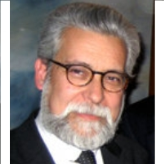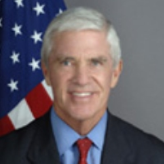Portugal
George Edward Glass, a major donor to Donald Trump’s presidential campaign, was repaid for his generosity by being nominated on June 19, 2017, to be the U.S. ambassador to Portugal.
Glass graduated from South Eugene (Oregon) High School and went on to the University of Oregon, where he earned a B.S. degree in 1982. He later served for a time on the board of trustees of his alma mater.
Glass worked in banking until branching out on his own in 1990, when he founded Pacific Crest Securities in Portland, Oregon. The company buys and sells technology stocks for institutional investors. Glass was the president and vice chairman of Pacific Crest until 2014, when it was sold to KeyBanc Capital Markets. He then concentrated on his real estate holdings as owner of MGG Development of Lake Oswego, Oregon, which manages apartment complexes and rental houses.
He originally supported Jeb Bush in the most recent presidential contest, giving him $2,700 in 2015. He was a bigger donor to Trump, giving Trump Victory $77,500, as well as $22,500 to Trump’s scaled-down inaugural and $33,400 to the Republican National Committee during the last cycle. He has also contributed tens of thousands of dollars to numerous state Republican parties, as well as to the presidential campaign.
In 2014, Glass and his wife founded the George And Mary Glass Foundation, which helps fund Catholic schools in Oregon.
Glass has visited Portugal at least once, in 2014, on a trip to the Fatima shrine and other attractions.
Glass and his wife, Mary, have three adult sons: Gordon, George and A.J. Glass enjoys hunting. He serves on the board of trustees of Oregon Health Sciences University.
-Steve Straehley
To Learn More:
Named: George E. Glass to be U.S. Ambassador to Portugal – Washington, D.C. (Portuguese American Journal)
Located on the Iberian Peninsula in Western Europe, Portugal was once a great sea-faring country with colonies spread across the globe, including Angola, Mozambique, Cape Verde, Guinea Bissau, Säo Tomé, Brazil and East Timor. But the 20th century brought a military government to power that turned Portugal into an authoritarian state under Dr. António Salazar. During the 1960s, various wars in Portuguese colonies drained much of the country’s wealth, and after the relatively bloodless Carnation Revolution of 1974, many of its colonies were granted independence. The exception was East Timor, which was invaded by Indonesia before it could be granted independence. Portugal continued to lobby on behalf of East Timor, which was finally granted independence in 2002. Portugal has enjoyed positive diplomatic relations with the US since just after the Revolutionary War, and the country continues to cooperate with the US on matters of counterterrorism and humanitarianism. In fact, the Portuguese government cooperated so readily with the government of George W. Bush that an investigation is looking into whether the CIA made secret stopovers in Portugal while ferrying terrorism suspects to hidden CIA prisons in other countries.
Lay of the Land: In Western Europe, forming the western strip of the Iberian Peninsula, Portugal is bounded on the north and east by Spain, and on the south and west by the Atlantic Ocean. The Tagus River bisects the country on a northeast-southwest slant, entering the Atlantic at Lisbon. The mountainous north enjoys considerable rainfall, while the drier south has a gentler terrain.
Portugal was originally settled in the 1st century BC by waves of invading Celts from Central Europe. Celts intermarried with members of other tribes and began to form settlements in the area that was to become Portugal.
A Bola (Portuguese)
Portuguese explorers may have preceded Columbus in the New World, and were the first to discover California when João Rodrigues Cabrillo arrived in San Diego Bay on September 9, 1542.
Noted Portuguese-Americans
US exports to Portugal totaled $1.1 billion in 2009 while US imports from Portugal amounted to $1.6 billion.
Portugal Investigates CIA Stopovers
According to the State Department, “Police and prison guards occasionally beat or otherwise abused detainees and prisoners, incarcerated minors were not held separately from adults, prison conditions were poor, and persons detained by police did not have an effective right to an attorney.” Prison and prison conditions are cited as the main problems, but incidents of women trafficking and sexual exploitation are also documented.
David Humphreys
 Vallera, João de
Vallera, João de
- Table of Contents
- News
- Overview
- Basic Information
- History
- Newspapers
- History of U.S. Relations with Portugal
- Current U.S. Relations with Portugal
- Where Does the Money Flow
- Controversies
- Human Rights
- Debate
- Past Ambassadors
- Ambassador to the U.S.
- Embassy Web Site in the U.S.
- Comments
- Leave a comment
U.S. Ambassador to Portugal

George Edward Glass, a major donor to Donald Trump’s presidential campaign, was repaid for his generosity by being nominated on June 19, 2017, to be the U.S. ambassador to Portugal.
Glass graduated from South Eugene (Oregon) High School and went on to the University of Oregon, where he earned a B.S. degree in 1982. He later served for a time on the board of trustees of his alma mater.
Glass worked in banking until branching out on his own in 1990, when he founded Pacific Crest Securities in Portland, Oregon. The company buys and sells technology stocks for institutional investors. Glass was the president and vice chairman of Pacific Crest until 2014, when it was sold to KeyBanc Capital Markets. He then concentrated on his real estate holdings as owner of MGG Development of Lake Oswego, Oregon, which manages apartment complexes and rental houses.
He originally supported Jeb Bush in the most recent presidential contest, giving him $2,700 in 2015. He was a bigger donor to Trump, giving Trump Victory $77,500, as well as $22,500 to Trump’s scaled-down inaugural and $33,400 to the Republican National Committee during the last cycle. He has also contributed tens of thousands of dollars to numerous state Republican parties, as well as to the presidential campaign.
In 2014, Glass and his wife founded the George And Mary Glass Foundation, which helps fund Catholic schools in Oregon.
Glass has visited Portugal at least once, in 2014, on a trip to the Fatima shrine and other attractions.
Glass and his wife, Mary, have three adult sons: Gordon, George and A.J. Glass enjoys hunting. He serves on the board of trustees of Oregon Health Sciences University.
-Steve Straehley
To Learn More:
Named: George E. Glass to be U.S. Ambassador to Portugal – Washington, D.C. (Portuguese American Journal)
morePrevious U.S. Ambassador to Portugal

George Edward Glass, a major donor to Donald Trump’s presidential campaign, was repaid for his generosity by being nominated on June 19, 2017, to be the U.S. ambassador to Portugal.
Glass graduated from South Eugene (Oregon) High School and went on to the University of Oregon, where he earned a B.S. degree in 1982. He later served for a time on the board of trustees of his alma mater.
Glass worked in banking until branching out on his own in 1990, when he founded Pacific Crest Securities in Portland, Oregon. The company buys and sells technology stocks for institutional investors. Glass was the president and vice chairman of Pacific Crest until 2014, when it was sold to KeyBanc Capital Markets. He then concentrated on his real estate holdings as owner of MGG Development of Lake Oswego, Oregon, which manages apartment complexes and rental houses.
He originally supported Jeb Bush in the most recent presidential contest, giving him $2,700 in 2015. He was a bigger donor to Trump, giving Trump Victory $77,500, as well as $22,500 to Trump’s scaled-down inaugural and $33,400 to the Republican National Committee during the last cycle. He has also contributed tens of thousands of dollars to numerous state Republican parties, as well as to the presidential campaign.
In 2014, Glass and his wife founded the George And Mary Glass Foundation, which helps fund Catholic schools in Oregon.
Glass has visited Portugal at least once, in 2014, on a trip to the Fatima shrine and other attractions.
Glass and his wife, Mary, have three adult sons: Gordon, George and A.J. Glass enjoys hunting. He serves on the board of trustees of Oregon Health Sciences University.
-Steve Straehley
To Learn More:
Named: George E. Glass to be U.S. Ambassador to Portugal – Washington, D.C. (Portuguese American Journal)
Located on the Iberian Peninsula in Western Europe, Portugal was once a great sea-faring country with colonies spread across the globe, including Angola, Mozambique, Cape Verde, Guinea Bissau, Säo Tomé, Brazil and East Timor. But the 20th century brought a military government to power that turned Portugal into an authoritarian state under Dr. António Salazar. During the 1960s, various wars in Portuguese colonies drained much of the country’s wealth, and after the relatively bloodless Carnation Revolution of 1974, many of its colonies were granted independence. The exception was East Timor, which was invaded by Indonesia before it could be granted independence. Portugal continued to lobby on behalf of East Timor, which was finally granted independence in 2002. Portugal has enjoyed positive diplomatic relations with the US since just after the Revolutionary War, and the country continues to cooperate with the US on matters of counterterrorism and humanitarianism. In fact, the Portuguese government cooperated so readily with the government of George W. Bush that an investigation is looking into whether the CIA made secret stopovers in Portugal while ferrying terrorism suspects to hidden CIA prisons in other countries.
Lay of the Land: In Western Europe, forming the western strip of the Iberian Peninsula, Portugal is bounded on the north and east by Spain, and on the south and west by the Atlantic Ocean. The Tagus River bisects the country on a northeast-southwest slant, entering the Atlantic at Lisbon. The mountainous north enjoys considerable rainfall, while the drier south has a gentler terrain.
Portugal was originally settled in the 1st century BC by waves of invading Celts from Central Europe. Celts intermarried with members of other tribes and began to form settlements in the area that was to become Portugal.
A Bola (Portuguese)
Portuguese explorers may have preceded Columbus in the New World, and were the first to discover California when João Rodrigues Cabrillo arrived in San Diego Bay on September 9, 1542.
Noted Portuguese-Americans
US exports to Portugal totaled $1.1 billion in 2009 while US imports from Portugal amounted to $1.6 billion.
Portugal Investigates CIA Stopovers
According to the State Department, “Police and prison guards occasionally beat or otherwise abused detainees and prisoners, incarcerated minors were not held separately from adults, prison conditions were poor, and persons detained by police did not have an effective right to an attorney.” Prison and prison conditions are cited as the main problems, but incidents of women trafficking and sexual exploitation are also documented.
David Humphreys
 Vallera, João de
Vallera, João de
Comments
U.S. Ambassador to Portugal

George Edward Glass, a major donor to Donald Trump’s presidential campaign, was repaid for his generosity by being nominated on June 19, 2017, to be the U.S. ambassador to Portugal.
Glass graduated from South Eugene (Oregon) High School and went on to the University of Oregon, where he earned a B.S. degree in 1982. He later served for a time on the board of trustees of his alma mater.
Glass worked in banking until branching out on his own in 1990, when he founded Pacific Crest Securities in Portland, Oregon. The company buys and sells technology stocks for institutional investors. Glass was the president and vice chairman of Pacific Crest until 2014, when it was sold to KeyBanc Capital Markets. He then concentrated on his real estate holdings as owner of MGG Development of Lake Oswego, Oregon, which manages apartment complexes and rental houses.
He originally supported Jeb Bush in the most recent presidential contest, giving him $2,700 in 2015. He was a bigger donor to Trump, giving Trump Victory $77,500, as well as $22,500 to Trump’s scaled-down inaugural and $33,400 to the Republican National Committee during the last cycle. He has also contributed tens of thousands of dollars to numerous state Republican parties, as well as to the presidential campaign.
In 2014, Glass and his wife founded the George And Mary Glass Foundation, which helps fund Catholic schools in Oregon.
Glass has visited Portugal at least once, in 2014, on a trip to the Fatima shrine and other attractions.
Glass and his wife, Mary, have three adult sons: Gordon, George and A.J. Glass enjoys hunting. He serves on the board of trustees of Oregon Health Sciences University.
-Steve Straehley
To Learn More:
Named: George E. Glass to be U.S. Ambassador to Portugal – Washington, D.C. (Portuguese American Journal)
morePrevious U.S. Ambassador to Portugal








Comments